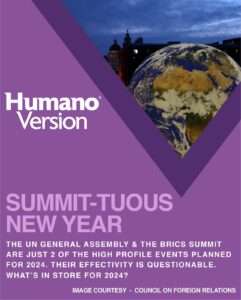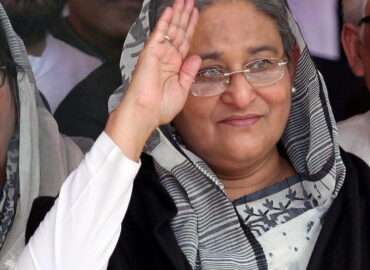
The past year witnessed numerous formidable challenges, including unprecedented global temperatures, ongoing conflicts worldwide, escalating food insecurity, and the widespread adoption of artificial intelligence (AI) technologies. As we enter 2024, pivotal global summits will persist in playing a crucial role, bringing together leaders from around the world to forge commitments and coordinate responses to these pressing issues and others.
In the upcoming year, many of these influential summits aim to build upon and actualize ambitious targets, pledges, and goals that have already been agreed upon. However, the efforts face a formidable challenge from mounting geopolitical tensions, posing a potential threat to their success precisely when collaboration is most imperative. The ability of cooperation to prevail remains uncertain. A list of summits that are to follow in the year 2024 are: WTO Ministerial Conference, Abu Dhabi, UAE (February 26–29); AI for Good Summit, Geneva, Switzerland (May 30–31); G7, Puglia, Italy (June 13–15); NATO Summit, Washington, DC, USA (July 9–11); UN General Assembly/Summit of the Future, New York City, USA (September 22–23); BRICS Summit, Kazan, Russia (October); COP29, Baku, Azerbaijan (November); UN Convention on Biological Diversity, Colombia (October 21–November 1); G20 Summit, Rio de Janeiro, Brazil (November 18–19); ASEAN Summit and East Asia Summit, Laos (Date TBD).
BRICS Summit & Expansion
The BRICS annual summit this time around will unveil a significant development as it announces the expansion of the group. Come January 2024, Argentina, Egypt, Ethiopia, Iran, Saudi Arabia, and the United Arab Emirates are set to join the coalition.
On Monday, January 1, Russia assumed the BRICS Chairmanship for 2024. President Vladimir Putin outlined the chairmanship’s motto as “Strengthening Multilateralism for Equitable Global Development and Security.” According to the Russian president, BRICS continues to gain support from an expanding number of nations that align with its fundamental principles.
These principles encompass “sovereign equality, respect for diverse development paths, mutual consideration of interests, transparency, consensus-building, the commitment to establishing a multipolar international order, a just global financial and trade system, and the pursuit of collective solutions to contemporary challenges.” With the emphasis on multilateralism in the summit’s motto, BRICS countries may reaffirm their commitment to a rules-based international order. Discussions on global governance structures and reforms, including those related to institutions like the United Nations, may be part of the agenda.
It’s important to note that the actual outcomes and significance of the BRICS 2024 Summit will depend on the specific discussions, agreements, and initiatives that take place during the event.
Tea-Party’s by the West
The G7 Summit scheduled for June 13–15, 2024, in Puglia, Italy, is expected to address a range of critical global issues. With a focus on economic recovery post-pandemic, the leaders are likely to discuss strategies for sustainable development and reducing inequality. Italy’s emphasis on rejecting a narrative of a divided world may shape discussions on geopolitical relations, defense, and international rules. The Partnership for Global Infrastructure and Investment, the G7’s response to China’s Belt and Road Initiative, is anticipated to be a significant topic, reflecting efforts to compete with the BRI and promote sustainable infrastructure. The summit is also expected to delve into the complexities of economic relations with China, exploring approaches to de-risking and diversifying while maintaining global economic stability.
The WTO Ministerial Conference, scheduled for February 26–29, 2024, in Abu Dhabi, United Arab Emirates, holds strategic importance for global trade. Reforming the WTO’s dispute settlement system and advancing the development agenda will likely be key priorities. The Fisheries Subsidies Agreement is anticipated to feature prominently, with efforts to secure its entry into force and conclude negotiations. Discussions on industrial policy, food and health security, climate change, and e-commerce are expected, highlighting the comprehensive nature of trade-related matters on the agenda. The accession of new members, such as Timor-Leste and Comoros, adds a dimension of expanding the WTO’s membership. Overall, the conference provides a platform for addressing challenges and advancing solutions in the complex landscape of international trade.
What are the outcomes from Summits?
Global summits, touted as critical platforms for international collaboration and problem-solving, often fall short of delivering the anticipated impactful outcomes. Despite the noble intentions behind these gatherings, numerous factors contribute to the challenges faced in translating discussions into tangible results.
One significant impediment is the inherent complexity of the global landscape. Countries, each with their unique interests, priorities, and agendas, converge at these summits, creating a dynamic and often contentious environment. Striking a balance between national interests and the greater global good becomes a formidable task. Disparities in economic strength, political ideologies, and cultural contexts contribute to divergent perspectives, making it challenging to reach consensus on crucial issues.
The issue of geopolitical tensions further compounds the difficulty of achieving positive outcomes. Nations engage in these summits with their strategic interests at the forefront, often leading to power struggles and an unwillingness to compromise. The pursuit of national security, territorial integrity, and economic dominance can overshadow the collaborative spirit necessary for successful global governance.
Another contributing factor is the inherent limitations of the summit format itself. The brief duration of these gatherings, often spanning just a few days, restricts the depth of deliberations. Complex issues requiring nuanced solutions may be oversimplified or postponed due to time constraints, leaving critical matters unresolved. The focus on high-profile announcements and symbolic gestures may overshadow the substantive, long-term actions required for meaningful change.
Moreover, the absence of enforceable mechanisms and repercussions for non-compliance diminishes the efficacy of summit agreements. While leaders may commit to resolutions and initiatives during these gatherings, the lack of accountability measures often results in slow or incomplete implementation. The failure to hold nations accountable for their commitments undermines the credibility of the entire summit process.
Additionally, the increasing influence of powerful nations can create an imbalance in decision-making. Dominant players may assert their interests to the detriment of smaller or less influential nations, eroding the principle of equal participation. This power dynamic can hinder the inclusivity necessary for effective multilateralism.
Despite these challenges, the need for global summits persists as a means of fostering dialogue, understanding, and cooperation. Efforts should be directed toward addressing these obstacles through improved diplomatic strategies, enhanced dialogue mechanisms, and a commitment to fostering an environment of mutual respect and collaboration.
In conclusion, while global summits serve as crucial forums for international cooperation, the complexities of global politics, geopolitical tensions, structural limitations, and the absence of accountability mechanisms contribute to the frequent lack of robust outcomes. Navigating these challenges requires a reevaluation of diplomatic approaches, a commitment to inclusivity, and a recognition of the evolving nature of global governance. Only through concerted efforts to overcome these hurdles can global summits fulfill their potential as catalysts for positive change on the world stage.





